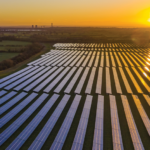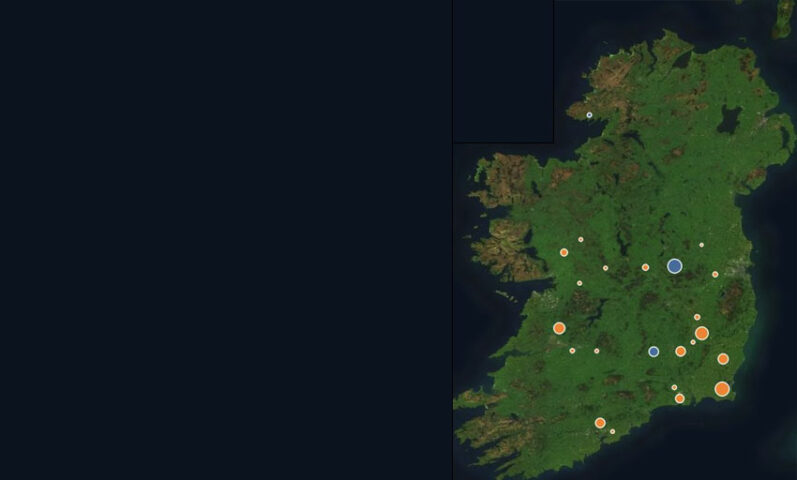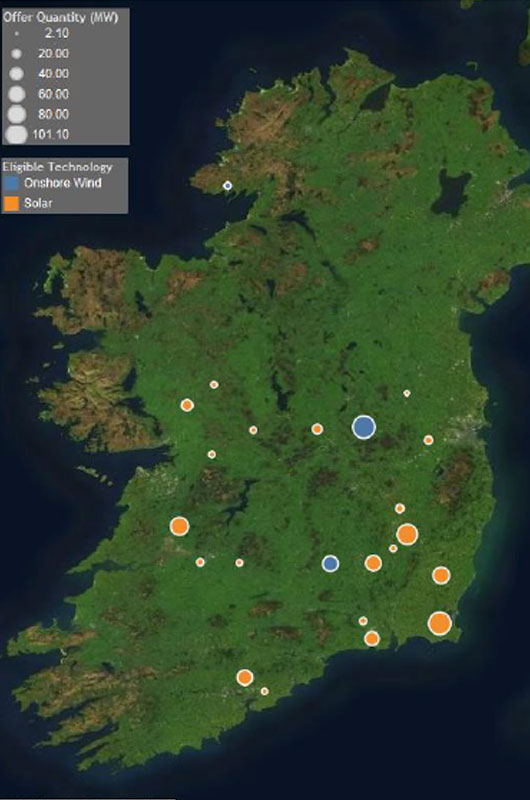
Grant embraces transition to fully renewable heating technology manufacturer
9th October 2023
Electricity consumption flexibility key to decarbonisation
9th October 2023RESS 3: Low levels and higher prices

Location of RESS 3 provisionally successful projects.
Provisional results of the Government’s third onshore renewable energy auction have been branded as “extremely disappointing” after the smallest level of generation to date was deemed successful.
Wind and solar industry bodies have called for reform of the planning system after the Renewable Electricity Support Scheme (RESS) 3 delivered the lowest volume of renewable energy to date, at a price higher than the previous auction.
 Just three wind farms (148MW) and 500MW of solar were deemed successful in the provisional results announced by EirGrid at the end of September 2023.
Just three wind farms (148MW) and 500MW of solar were deemed successful in the provisional results announced by EirGrid at the end of September 2023.
The average price for all projects is €100.47 per megawatt hour, an increase compared to €97.87 for RESS 2.
A total of 36 projects applied to participate in the RESS 3 qualification process, with 33 qualifying to participate and 31 submitting an offer price. Of the 31, 23 projects have been deemed provisionally successful, with eight provisionally unsuccessful.
The three onshore wind projects vary significantly in size. Green Wind Energy’s Yellow River Wind Farm in Wexford is the second largest overall project and largest wind project accepted at 101MW. Gromane Limited’s Farranroy Wind Farm is offering 43.2 MW, while Bradan Wind’s Bradan Wind Farm is 4.2MW.
Of the 20 solar projects accepted, ESB Solar’s Tracystown Solar Park is the largest of all the projects accepted at 101.1MW, and projects range in size down to the Tead More Solar project (3.95MW), the smallest successful applicant.
The competitive auction determines which generators receive support, which typically applies for approximately 15 years.
Following the publication, Wind Energy Ireland said that Climate Action Plan targets are “unachievable” without government action.
CEO Noel Cunniffe congratulated those successful in the auction but said that rising prices and lowering of renewable energy volume in the latest auction is the opposite to what should be occurring.
“At a time when we should be accelerating the delivery of renewable energy, we are slowing down, he says, “The critical issue remains the failure of the Irish planning system to meet its timelines for processing applications for renewable energy projects.”
He adds: “We are living in an energy and climate crisis, but we do not have a planning system that has been given the resources, the expertise and the personnel to deliver.”
Calling on the Government to urgently review the development of renewable energy and the RESS auction system, Cunniffe states: “The system is not working. We cannot make Ireland more energy-independent and achieve our 2030 Climate Action Plan targets this way.”
Adding to the criticism, Conall Bolger, CEO of the Irish Solar Energy Association (ISEA) described the RESS 3 auction as “overly rigid” and said that avoidable systemic failures limited its potential for success.
“There is close to universal support for the vision behind these annual auctions. However, what started out with a clear goal to boost the level of renewables in Ireland has become bogged down in overly complex terms, conditions, rules, and red tape. The sum total of this has been that RESS 3 delivered fewer projects and less green energy than should have been the case and done so at a higher cost to consumers,” he says.
